Seminars and Panels
|
How Economics Shapes Science
Professor Paula Stephan
|
Sep 10, 2014
|

The talk explores how public research organizations and scientists respond to incentives and costs. It’s a good news/bad news story: get incentives and costs right and one can enhance productivity and use resources more efficiently. Get them wrong and there are severe consequences for productivity and efficiency. Examples of how incentives and costs affect behavior are provided primarily for the United States. The discussion of costs examines how costs play a role in determining where research is done, how research is done, who does the research, the kinds of materials that are used, when the research is done and what research is done. The talk then focuses on the various forms that monetary and non-monetary incentives take in science and how they shape the behavior of both scientists and the institutions where they work. It closes with a discussion of examples of areas where outcomes in science are inefficient. These include incentives for submitting papers to top tier journals such as Science and Nature, incentives for constructing new buildings, incentives that encourage scientists to be risk adverse, and incentives and costs that lead the United States to 'over produce' PhDs in a number of fields.
About Professor Paula Stephan
Stephan’s research interests focus on the careers of scientists and engineers and the process by which knowledge moves across institutional boundaries in the economy. She is a member of the Board on Higher Education and Workforce, National Academies of Sciences, a fellow of the American Association for the Advancement of Science and a member of the board of reviewing editors, Science. She currently serves on the European Research Council’s Expert Group on Key Performance Indicators. She served on the National Advisory General Medical Sciences Council, National Institutes of Health from 2005-2009 and served on the Advisory Committee of the Social, Behavioral, and Economics Programs, National Science Foundation, 2001-2008. In 2012 Science Careers named Stephan as their first 'person of the year'. Her research has been supported by the Alfred P. Sloan Foundation, the Andrew W. Mellow Foundation, and the National Science Foundation. Dr. Stephan graduated from Grinnell College (Phi Beta Kappa) with a B.A. in Economics and earned both her M.A. and Ph.D. in Economics from the University of Michigan. She has been a visiting scholar at Katholeike Universiteit Leuven, Belgium, the Wizzenschaf Zentrum fur Social Forchung, Berlin, a Wertheim Fellow, Harvard University, and an ICER fellow, Turin, Italy.
Stephan is a research associate, National Bureau of Economic Research.
Stephan has published numerous articles in such journals as The American Economic Review, Science, Nature, The Journal of Economic Literature, Management Science, Organization Science, Economic Inquiry, The International Economic Review and Social Studies of Science. She co-wrote, with Sharon Levin, Striking the Mother Lode in Science (Oxford University Press, 1992). Her book, How Economics Shapes Science, was published by Harvard University Press in 2012. It was translated into Korean in 2013 and is scheduled for release in Chinese in 2014.
Click here to view the webcast. |
|
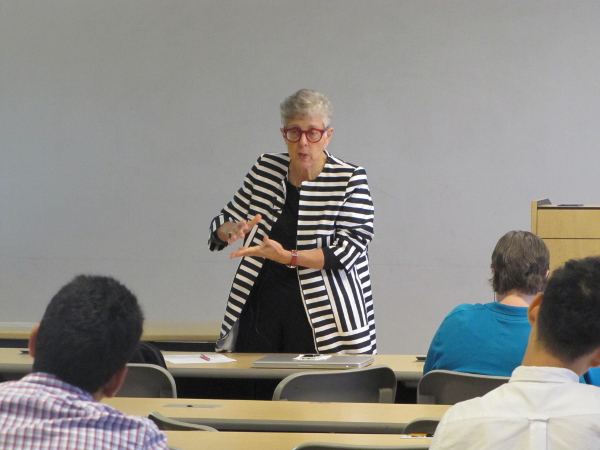
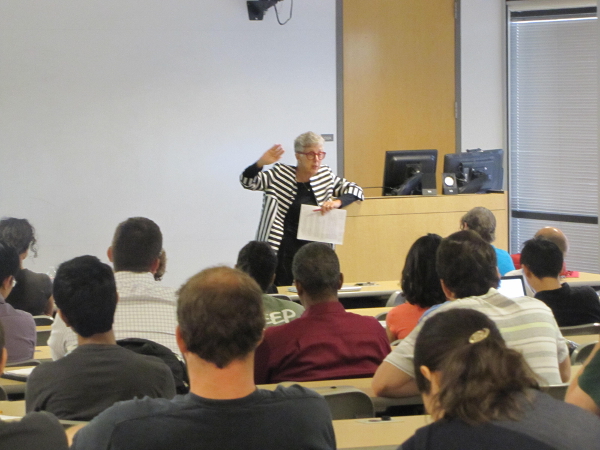
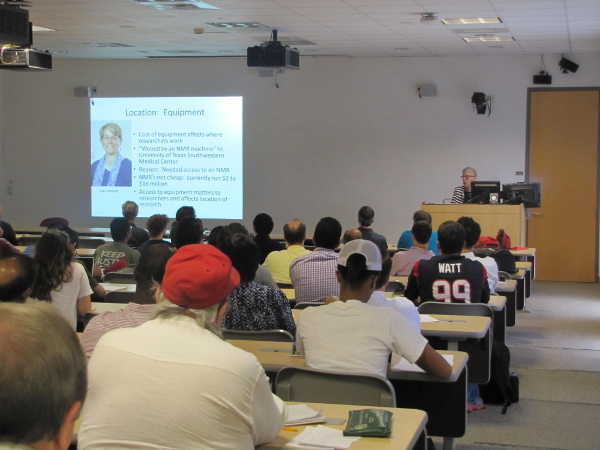
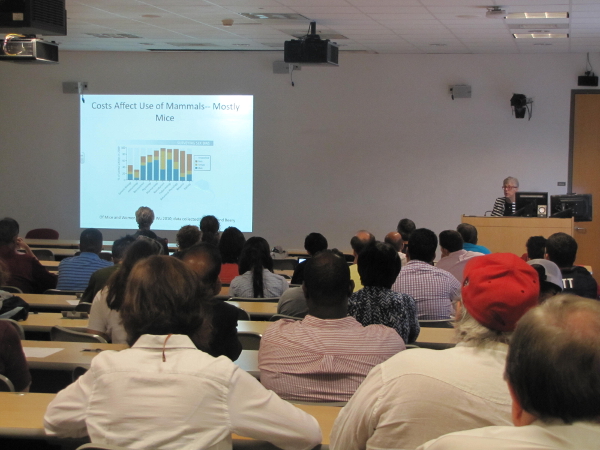
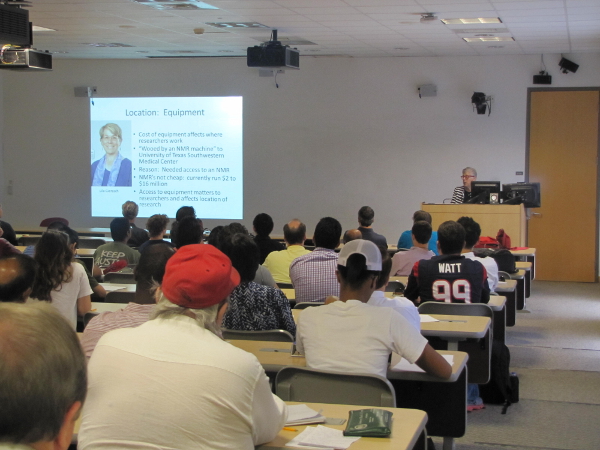
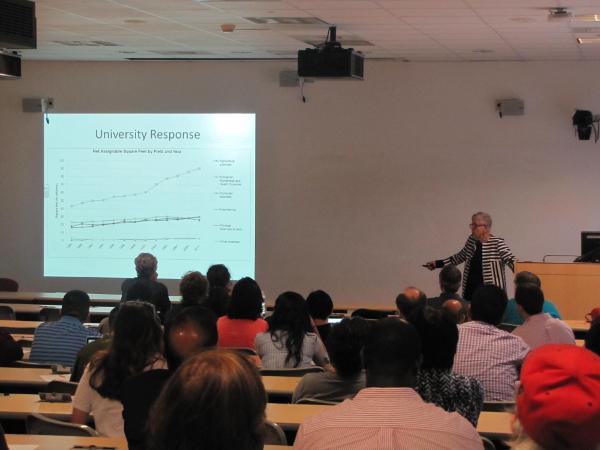
Audience Feedback |
n = 61 |
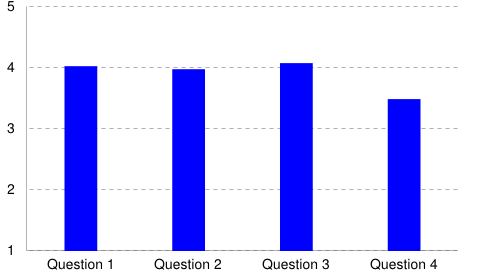
Question 1 - How interesting was the topic to you?
Question 2 - Did you learn anything useful?
Question 3 - How would you rate the quality of the presentation?
Question 4 - How would you rate the quality of the audience's interaction with the speaker?
Selective Comments
"Very Good"
"The few questions I had were answered before the lecture finished, so that is a sign of how comprehensive Dr. Stephan's presentation was."
"This has the potential to be a very enlightening series. Keep up the good work!"
- 2017 - 2018
- 2016 - 2017
- Behavioral Concepts and the Sciences of Human Behavior
H. Longino Apr 21, 2017 - Insane Asylums and Genetics: How Human Heredity Became a Data Science
T. Porter Feb 17, 2017 - The Nature of Pride: The Emotional Origins of Social Rank
J. Tracy Jan 23, 2017
- Behavioral Concepts and the Sciences of Human Behavior
- 2015 - 2016
-
Public Ethics, Politics and Sociobiology
M. P. Sheldon Mar 11, 2016 -
Classifying People by Color: How Racial Categories Change Over Time
A. A. Martinez Feb 29, 2016 -
The Origin of Social Impulse: E.O. Wilson's Recent and Controversial Rejection of Kin Selection in Historical Context
A. Gibson Dec 4, 2015
-
Public Ethics, Politics and Sociobiology
- 2014 - 2015
-
Special Event: Lone Star History of Science Meeting Writing the Origin with Burned Fingers: Darwin's Penance for the "Sin of Speculation"A. Sponsel Apr 3, 2015 - Welfare, Work, and Witness: Why Clinical Research Can Survive the Death of a Healthy Human Subject
L. Stark Apr 3, 2015 - The Distinctive Significance of Systemic Risk
A. James Mar 6, 2015 - The Devil's Heritage: Masuo Kodani, the "Nisei Problem," and Social Stratification at the Atomic Bomb Casualty Commission in Japan (1946-1954)
V.B. Smocovitis Jan 28, 2015 - Atypical Combinations and Scientific Impact
B. Uzzi Dec 8, 2014 - Psychology of Science and Technology
M. Gorman Nov 17, 2014 - How Economics Shapes Science
P. Stephan Sep 10, 2014
-
- 2013 - 2014
- The Decision to Put David Vetter in the Bubble
J. H. Jones Apr 16, 2014 - Ethical Paradoxes of
Control: Science, Engineering, and the Expansion of Moral ResponsibilityR. Hollander Mar 3, 2014 - 'Broken Symmetry': Humanism, Militarism, and the Dilemmas of Scientific Identity in Nuclear Age America.
J. Wang Feb 17, 2014 - Using Creative Non-Fiction in Teaching Research Ethics
C.M. Klugman Dec 2, 2013 - Does Neuroscience Undermine Responsibility?
W. Sinnott-Armstrong Nov 15, 2013 - Arming Mother Nature: The Birth of Catastrophic Environmentalism
J. Hamblin Oct 18, 2013
- The Decision to Put David Vetter in the Bubble
- 2012 - 2013
- Lead Wars: the Politics of Science and the Fate of America's Children
D. Rosner Mar 25, 2013 - Identifying potential pitfalls in the quantitative appraisal system for scientific careers
A.M. Petersen Dec 3, 2012 - Keeping Secrets: Scientists' strategic management of militarization, 1945-1980
S. Lindee Nov 12, 2012 - Evolutionary Theory as Methodological Anesthesia: Methodological and Philosophical Lessons from Evolutionary Psychology
R.N. Boyd Oct 19, 2012 - Panel on Peer-Review Issues
Oct 11, 2012
- Can technology enable cities to cope with the economic winter?
A. Hampapur Sep 21, 2012
- Lead Wars: the Politics of Science and the Fate of America's Children
- 2011 - 2012
- Engineering Success and Failure on 9/11
S.K.A. Pfatteicher Apr 27, 2012 - Regulating Ionizing Radiation: Flawed Standard, Flawed Ethics
K.S. Frechette Mar 5, 2012 - Do fish feel pain?
C. Allen Jan 25, 2012 - The Ethics of Relevancy
J. Levine Dec 13, 2011 - ORI Cases and How to Protect Yourself from Research Misconduct in Your Labratory
A.R. Price Nov 7, 2011
- Engineering Success and Failure on 9/11











